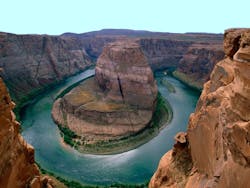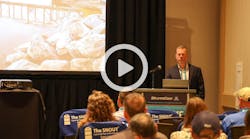Fluvial Geomorphology (for Those Who Skipped It in College)
Whether you’re working on a water resources project, stream restoration, bank stabilization, or simply are looking to brush up on the fluvial geomorphology basics…you’re in luck. We’re diving beyond the surface of fluvial geomorphology and into the depths to catch you up with the latest theories, approaches, and tools.
Join two-time former IECA President and returning speaker, David T. Williams for the third part of our Surface Water Master Class Series, a live and on-demand two-session presentation series exploring the fundamentals of river system behavior, intricacies, and dynamics, as well as fluvial geomorphology’s theories and principals; theoretical and applied approaches; and tools and technology relating to river forms, sedimentation, hydraulics, and streambank erosion and protection.
In this two-session presentation, we’ll explore the fundamentals of fluvial geomorphology examining the evolution, structure, function, intricacies, and dynamics of river systems, and how fluvial geomorphology intersects with other disciplines (e.g., geology, ecology, engineering, etc.). After covering the basics, we’ll delve deeper into watersheds, hillslope and stream hydrology, soil erosion and land degradation,
river channel dynamics, sediment transport, flooding and flood management, floodplains, and deltas.
- Jun. 16: Fluvial Geomorphology 101, Part I
In this session we’ll explore fluvial geomorphology and its relationship
with watersheds, including the common terms and watershed
elements, stability and in-stability definitions and conditions,
and causes of river instability. Additionally, we’ll discuss watershed
hydrological classification, channel profile and shape, and limitation
of channel layouts for stream restoration projects. - Jun. 18: Fluvial Geomorphology, Part II
In this session we’ll move beyond river behavior and into the
computational tools you can use to determine design features for
restoring streams based upon fluvial geomorphologic theories. We’ll
continue the discussion with various channel forms and their important
features, as well as explore the Rosgen stream classification system,
guidelines, and best practices for use. Finally, we’ll take a look at
advanced stream restoration projects and their involvement
of geomorphology, including channel forming discharge and
equilibrium slopes.
Learning Objectives
Attendees can expect the discussion and education of the following learning objectives:
- Learn fluvial geomorphology concepts and terms.
- Understand the fundamental forces of nature that determine the
forms of a river. - Understand the relationship of river forms, stream bank protection,
and erosion control. - Learn the significance stream restoration as it relates to
fluvial geomorphology. - Recognize the functional components of a watershed and river.
Surface Water Master Class Series
This session is the third installment of our eight-session Surface Water Master Class Series. Currently, we are offering the full Master Class Series at a discounted rate. If you are interested in purchasing the full Master Class Series, you can find information and the registration link here.



